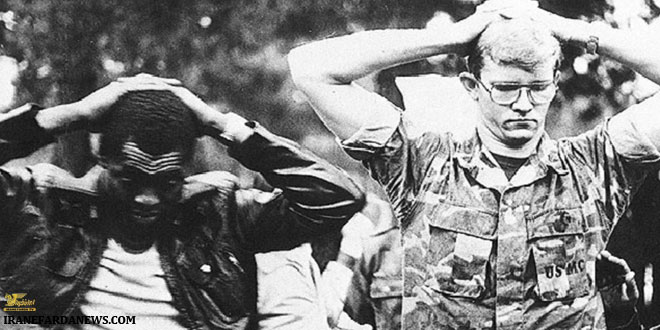
by:Golnaz Esfandiari
The face of the Iran hostage crisis probably never envisioned the day her child would enroll at a university in the “Great Satan.”
Yet the oldest son of Massumeh Ebtekar — a sitting vice president who made a name for herself as “Mary,” spokeswoman for the Islamic student revolutionaries who seized the U.S. Embassy in Tehran in 1979 — sure looks like he’s living the college dream in California.
Ebtekar’s son, 33-year-old Eissa Hashemi, is a doctoral student at the Los Angeles branch of the Chicago School of Professional Psychology, according to his LinkedIn profile.
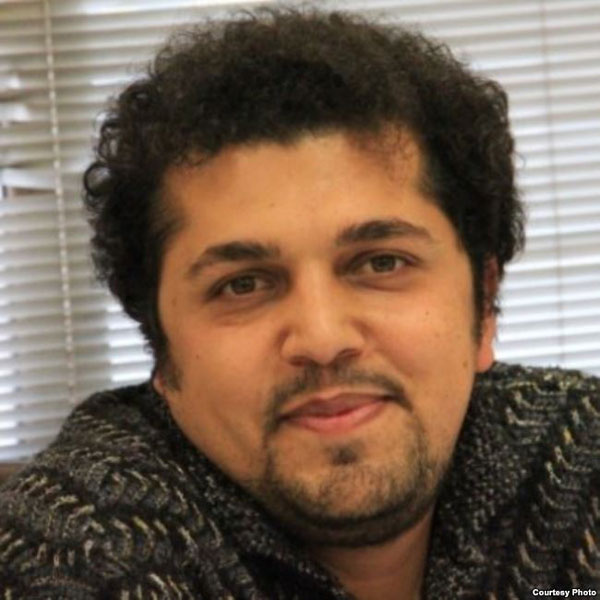 Eissa Hashemi, the son of Iranian Vice President Massumeh Ebtekar
Eissa Hashemi, the son of Iranian Vice President Massumeh Ebtekar
A spokesperson for the graduate school did not confirm his registration, citing its privacy policy. But his wife, Maryam Tahmasebi, has listed Los Angeles as her home city on her Facebook page. And an acquaintance of the couple has confirmed to RFE/RL on condition of anonymity that the two have been living in the United States for several months.
As Hashemi pursues a PhD in organizational leadership, he appears to be enjoying his time in the country demonized by Iranian revolutionaries, including his parents.
His recent Instagram posts include a beach selfie, inspirational quotes printed on teabag tags, and a video of the San Francisco National Cemetery, the final resting place of tens of thousands of U.S. military veterans.
And by posting a screengrab of a Facebook conversation thread on social media, he has revealed an appreciation for some high-profile Americans.
The thread shows him “liking” a White House photo marking the October 3 wedding anniversary of U.S. President Barack Obama and first lady Michelle Obama. But it concludes by noticing that both he and Facebook founder Mark Zuckerberg have something in common.
“We liked it,” he wrote, concluding with a smiley :).
Mother ‘Mary’
During the hostage crisis, when 52 U.S. citizens were held captive for 444 days, “Mary” became a familiar sight on American television.
Exhibiting excellent command of the English language, she faced the cameras to outline the positions, demands, and threats (watch from 4:40 mark) of the hostage-takers’ group — the Muslim Student Followers of the Supreme Leader.
The young woman, who would later be revealed to be Massumeh Ebtekar, repeatedly and unabashedly explained her hatred for the United States.
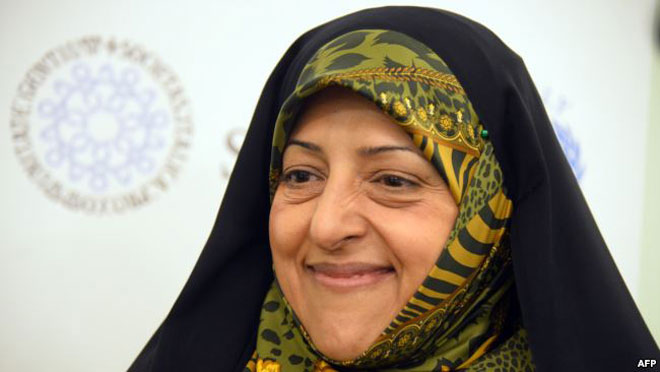 Iranian Vice President Massumeh Ebtekar in November
Iranian Vice President Massumeh Ebtekar in November
She later married one of the core hostage takers, Mohammad Hashemi, a former deputy intelligence minister turned businessman.
In a recent interview, Hashemi explained that he recruited Ebtekar to be the hostage-takers’ spokeswoman shortly after the seizure of the U.S. Embassy because of the language fluency she gained growing up in Philadelphia, where her father studied.
Eissa Hashemi is not alone — a number of children of Iranian officials have reportedly made the choice to study in Western countries, including the United States.
But as could be expected, Hashemi’s choice has led critics to question how his parents could allow their son to study in the country they once regularly denounced. After all, hostility toward the United States is one of the pillars of the Islamic establishment that Ebtekar and her husband helped forge.
Harsh Reaction At Home…
Ebtekar’s revolutionary fervor has waned somewhat over the years. Now 55 and a vice president, she has mellowed to the point that she can be considered a reformist, and is a supporter of President Hassan Rohani’s efforts to engage with the West.
For this she’s been criticized by hard-liners who vehemently oppose the idea of the Islamic republic taking a more moderate approach both at home and on the international scene.
When an Iranian news site first broke the story in late 2014 that the younger Hashemi would be studying in the United States, there was some criticism on social media but the news went unnoticed by the mainstream media.
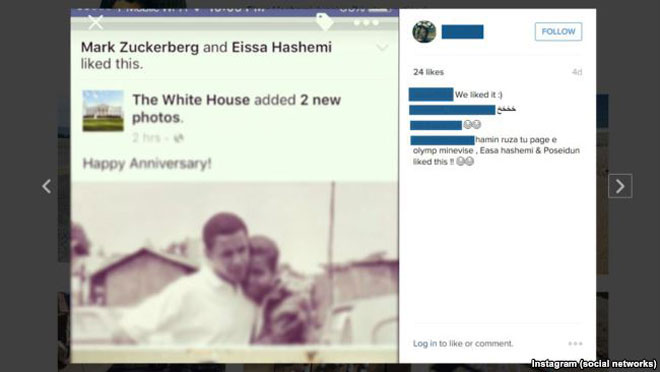 Screen shot of Obama’s post on Instagram in October 2015 that Hashemi and Zuckerberg “liked” at the same time.
Screen shot of Obama’s post on Instagram in October 2015 that Hashemi and Zuckerberg “liked” at the same time.
That changed in September when an anonymous blog post about Ebtekar on the news site Iranwire gave the story new life. The post mentioned Hashemi’s presence in the United States, prompting a new wave of criticism.
Amid the controversy, neither Ebtekar nor her husband has commented publicly on the reports that their son is studying in California, and their silence has not quieted their critics.
“The Great Satan is not such bad place after all,” a 35-year-old engineer in Tehran told RFE/RL via the messaging app Telegram, when asked about his reaction to the news that Ebtekar’s son was studying in the United States.
“Iranian officials are hypocritical, even these moderate figures,” he wrote, noting that ordinary citizens have suffered as the result of three decades of enmity with the United States.
He, too, had hoped to study in the United States, but the obstacles were too formidable to overcome. “There is no U.S. embassy in Tehran because of the hostage taking,” he wrote. “We have to travel to Dubai or Turkey to request a visa, and everyone knows how difficult and costly it can be.”
…And Abroad
Karim Sadjadpour, senior Iran analyst at the Carnegie Endowment for International Peace, says the issue of studying abroad is a sensitive one in the Iran.
Because of the actions of Ebtekar and her fellow hostage takers, “tens of thousands of Iranians” have been denied visas to visit their families or study in the United States, Sadjadpour notes. It stings when people see officials like Ebtekar staunchly defend the laws and values of the Islamic republic but flaunt them when it comes to their personal lives.
“They praise the achievements of the revolution, and attack the immorality of the U.S., while sending their children to live and study in the U.S.,” Sadjadpour says.
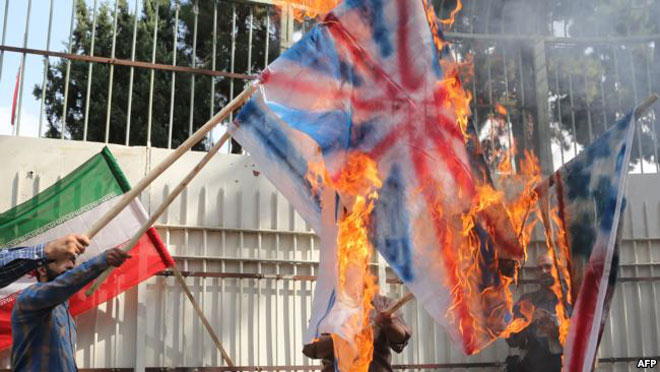 Iranians burn U.S., British, and Israeli flags at the inauguration of an anti-U.S. panel on the wall of the former U.S. Embassy in Tehran on September 2, 2015.
Iranians burn U.S., British, and Israeli flags at the inauguration of an anti-U.S. panel on the wall of the former U.S. Embassy in Tehran on September 2, 2015.
Iranians burn U.S., British, and Israeli flags at the inauguration of an anti-U.S. panel on the wall of the former U.S. Embassy in Tehran on September 2, 2015.
In the three decades since the hostage crisis, which led to the breaking off of diplomatic ties between Tehran and Washington, Ebtekar has stuck to the line that the hostage takers did what they had to do.
“The decision should be viewed in the context of the conditions of that time; in our view it was the best move to prevent the revolution from being harmed,” she said as recently as 2013 during an event held in Tehran to discuss the hostage taking and the Oscar-winning movie Argo, which was about the crisis.
As Sadjadpour notes, “several of the prominent hostage takers of 1979 came to realize they were stupid kids whose actions had profoundly negative consequences.” But Ebtekar, he says, “has never expressed remorse.”
To former U.S. hostage and State Department official John Limbert, the irony that sons of the Islamic Revolution are studying in the United States is exasperating.
Limbert was among those held captive for 444 days, during which time he was subjected to psychological torture. “[Ebtekar] and her husband built their career on yelling ‘Death to America,'” he says.
“Aren’t they ashamed of themselves?” Limbert asks. “It would be okay if they would simply say we screwed up.”
Living Two Lives
Eissa Hashemi did not respond to an interview request by RFE/RL.
But a person identifying him- or herself as the administrator of Massumeh Ebtekar’s webpages, responding to queries from RFE/RL from a different e-mail account, wrote that upon completing their master’s programs in Iran, Hashemi and his wife had decided to obtain their PhDs abroad.
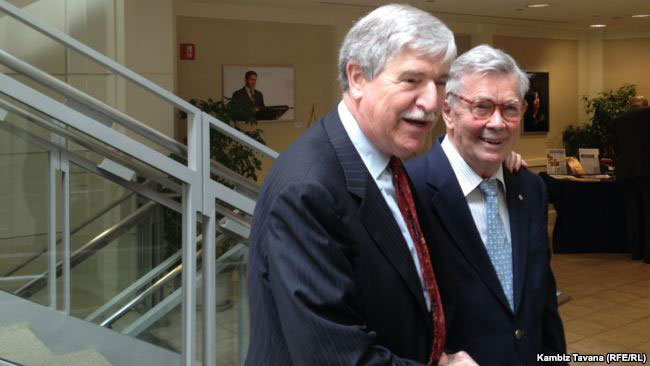 Former U.S. hostages in Iran John Limbert (left) and Bruce Laingen in 2013
Former U.S. hostages in Iran John Limbert (left) and Bruce Laingen in 2013
The e-mail said the couple’s move was a “personal decision” and that they were studying on their own expense and without the benefit of scholarships or “special” connections.
“They’re not interested in providing any explanation about it,” the e-mail read.
Like some children of former Islamic revolutionaries, Hashemi does not appear to be ideologically oriented.
In an interview published in 2008, Hashemi provided a rare window into his views on the hostage crisis, saying he got a grasp of the reasons behind it after reading a book his mother published in Canada.
“When mother’s book was translated from English, I understood the issue fully,” he said. “The students then had a big move, an important cause.”
More recently, he provided a possible hint at his current leanings when he posted a video of President Rohani mocking hard-line clerics for fostering state intervention in all aspects of citizens’ lives.
Hashemi’s apparent move to the United States — coming at a time of decreased tensions between Tehran and Washington and other world powers following the historic nuclear deal agreed to in July, even as Iran’s hard-liners maintain that the United States remains an enemy — is perhaps evidence that the doctoral student is simply living out his own philosophy.
Writing on his LinkedIn page, he says he has divided his work life into two parts:
One is the “doing part” — which includes “HSE planning and Auditing, Manager representative in Management Systems.”
The other is the “being part” — which includes “Jungian Psychology, Teaching Jungian Archetypal Studies, Awakening The hero Withing (sic), and Psychoanalysis.
“I love to have these both together,” he concludes, “and I will try to keep them so.”
 khalijefars News, Blogs, Art and Community
khalijefars News, Blogs, Art and Community








